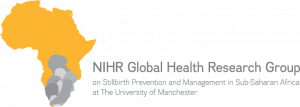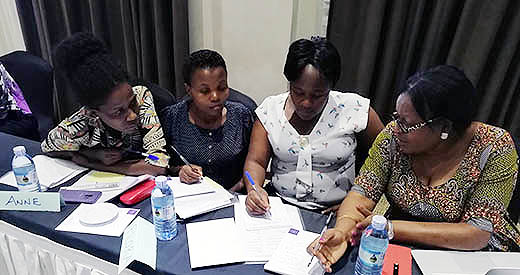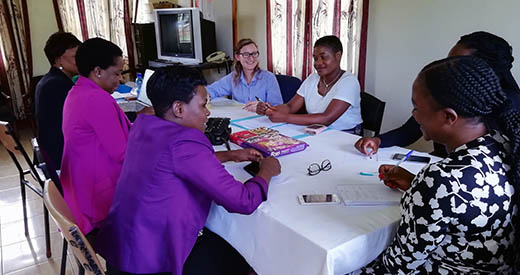COVID-19 Resources
- WHO online course on Infection Prevention and Control: https://openwho.org/courses/COVID-19-IPC-EN
- WHO infographics on COVID-19 and childbirth: https://www.who.int/reproductivehealth/publications/emergencies/COVID-19-pregnancy-ipc-breastfeeding-infographics/en/
- RCOG / ICM Guideline on COVID-19 Infection in pregnancy: https://www.rcog.org.uk/globalassets/documents/guidelines/2020-04-09-coronavirus-covid-19-infection-in-pregnancy.pdf
- WHO online course on How to put on and remove personal protective equipment (PPE): https://openwho.org/courses/IPC-PPE-EN
- ICM list of COVID-19 related resources: https://www.internationalmidwives.org/covid-19-resources.html
- WHO additional online courses on COVID-19: https://openwho.org/courses?channel=covid-19&lang=en
Read the Special issue of our Newsletter related to COVID - 19 impact and response
Background
The NIHR Global Health Research Group on Stillbirth Prevention and Management in Sub-Saharan Africa is a research collaboration between The Centre For Global Women’s Health at The University of Manchester and the Lugina Africa Midwives Research Network (LAMRN). LAMRN is a midwifery led research network operating in Kenya, Malawi, Tanzania, Uganda, Zambia and Zimbabwe.
Since 2013, through funding received from the Department for International Development (DFID) this collaboration has enabled the training of midwives in research methodologies to promote evidence-based practice in midwifery, and improve maternal and neonatal health outcomes in low resource settings.
This collaboration has succeeded in:
- enabling midwives to engage in development opportunities and conduct advanced research;
- strengthening the leadership capacity of the LAMRN partners in each country;
- supporting the improvement of institutional infrastructure at healthcare organisations across sub-Saharan Africa.

What is stillbirth and how does it affect women and their families?
Stillbirth refers to the death of a baby before or during childbirth. In 2015, it was estimated there were 2.6 million stillborn annually, of which 98% occur in Low and Middle-Income countries (referred to as LMIC).
Stillbirth is one of the most traumatic life experiences for parents and often results in psychological distress and long term consequences for bereaved families. In the event of any death during pregnancy or childbirth, it is essential that the affected women and families can access humane and responsive care and support.
Stillbirth rates in sub-Saharan Africa
- Kenya: 22.5
- Malawi: 22
- Tanzania: 22
- Sub-Saharan Africa: 29
- Uganda: 21
- Zambia: 21
- Zimbabwe: 21
- High-income countries: 3
Source: UNICEF, 2015
What causes stillbirth?
Stillbirths are caused by complications during childbirth, post-term pregnancy, maternal infections during pregnancy (malaria, syphilis and HIV), hypertension, obesity and diabetes, fetal growth restrictions, placenta disorder and congenital abnormalities.
In LMIC, stillbirths mainly occur during the birth (or intrapartum) and could be prevented with timely access to emergency obstetric care.

What we do
We collaborate with our partners in Kenya, Malawi, Tanzania, Uganda, Zambia and Zimbabwe to promote knowledge sharing and capacity building in stillbirth prevention and management.
Our aim is:
- to gain a better understanding of stillbirth, childbirth and bereavement care in high burden settings;
- to develop culturally relevant studies for further investigation in this unexplored area of stillbirth;
- to establish ourselves in the global healthcare arena as a catalyst for change.
Together we are committed to ending preventable stillbirth and ensuring quality care for parents experiencing the death of their babies before, during or soon after birth.
We work towards this by addressing three areas of care.
Prevention and detection of stillbirth
Our team in Zimbabwe and Malawi is working to improve identification of women with high risk pregnancies, so that potential stillbirths can be detected at an earlier stage and preventative measures put in place. As part of this work, we are delivering:
- a cross-sectional study in Zimbabwe to determine the main risk factors associated with stillbirth.
- a clinical audit of stillbirth in Malawi to capture all the important clinical aspects of a stillbirth in order to improve the quality of care.
Promoting evidence-based intrapartum care
In Tanzania and Zambia, our team promote evidence-based intrapartum care by examining factors which influence how women seek and access care, the quality of the care received and specific causes of stillbirth in local healthcare facilities. As part of this work, we are delivering an exploratory mix-method study in Tanzania and Zambia to understand the complexities surrounding delays in getting effective intrapartum care.
Ensuring humane and respectful care for bereaved parents
In Kenya and Uganda, our team is gaining a better understanding of the experiences of women, partners and health workers after stillbirth, so that respectful care can be delivered more effectively. This work includes a qualitative study in Kenya and Uganda to explore experiences of women, families and healthcare workers of care and emotional support after stillbirth.
Read more about how we aim to improve neonatal and maternal care in Africa.
Contact us
Professor Dame Tina Lavender
Chief Investigator NIHR Stillbirth Group
Email: tina.lavender@manchester.ac.uk
Professor Angela Chimwaza
Lugina African Midwives Research Network (LAMRN) Chair
Email: afchimwaza@kcn.unima.mw
Roy Daley
Programme Manager
Email: roy.daley-2@manchester.ac.uk
Jonathan Wood
Research Administrator
NIHR Global Health Research Group on Stillbirth Prevention and Management in Sub-Saharan Africa
Tel: +44 (0)161 306 7753
Email: jonathan.wood-3@manchester.ac.uk
The University of Manchester
4.338 Jean McFarlane Building,
Oxford Rd,
Manchester
M13 9PL
![]() Follow us on Twitter and join the #NIHRGlobalHealth conversation.
Follow us on Twitter and join the #NIHRGlobalHealth conversation.


This research was funded by the National Institute for Health Research (NIHR) (16/137/53) using UK aid from the UK Government to support global health research. The views expressed in this publication are those of the author(s) and not necessarily those of the NIHR or the UK Department of Health and Social Care.


